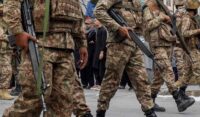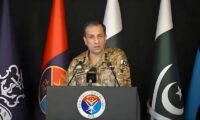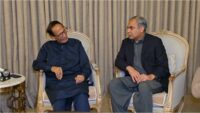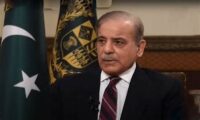Pakistan’s military has warned that India’s state institutions, including its armed forces, are increasingly being influenced by extremist political ideologies rooted in Hindutva nationalism.
In an interview with a German news outlet, Director General of Inter-Services Public Relations (ISPR), Lt Gen Ahmed Sharif Chaudhry, highlighted the urgent need for international intervention, particularly by the United States, to address the root causes of the longstanding conflict between Pakistan and India.
Referring to the recent May conflict between the two nuclear-armed neighbours, Lt Gen Chaudhry noted that while there may currently be a ceasefire in place, the underlying conflicts remain unresolved. “On May 10, actually the fire ceased — it’s the cease of fire that happened, [but] the conflict endures.” “Whether it’s the Kashmir issue, whether its the state-sponsored terrorism of India. Whether it is the rising extremism of Hindutva mentality, or rationality that has gripped India,” Lt Gen Chaudhry said.
Stating Pakistan’s position on the matter, he said, “Pakistan believes that the issues need [a] resolution,” calling for international actors to intervene. “Especially players like the USA, they must intervene,” he said. “[….] It is important for the international community […] through its mediation, the Indians are made to realise that this sort of irrationality, strategic arrogance, hubristic attitude that they’ve adopted, its not going to work.”
Censuring India’s approach of externalising its internal problems and vice-versa, the military spokesperson highlighted that New Delhi faces an internal issue of the oppression of minorities, especially Muslims.
“If you see IIOJK, there are one million strong Indian security forces’ personnel there. Any house can be searched at any time [….] and you blatantly say that Pakistan is sponsoring terrorism. So you [India] have an internal that you are externalising”.
He went on to say: “We have no doubt in our minds in Pakistan that each and every incident of terrorism that happens in Pakistan — behind that is Indian support and its abetment.”
Noting Pakistan’s efforts in curbing terrorism and the frequency of terrorist attacks in the country, DG ISPR highlighted that, “just by the threat that is coming to Pakistan, any sane mind can understand this cannot go on without external support.”
DG ISPR said that, “the base of operation that the Indians use is Afghanistan, the whole of terrorism that is being done is executed by the Indians over there.” “Indians have a playbook of using terror as a tool of state,” he said, adding that their “main tools” at the moment are terrorist outfits Tehreek-e-Taliban Pakistan (TTP) and BLA.
When asked about Chief of Army Staff (COAS) Field Marshal Asim Munir’s recent visits to the US and their significance for Pakistan-US relations — in the wake of the India conflict — the ISPR DG said that Washington played a very constructive role back then. The military’s spokesperson further maintained that Islamabad does not view its relationship with the US and other countries in “either or” terms and enjoys a constructive and strategic relationship with China and other countries.
Addressing the allegations claiming that Pakistan was supporting terrorism, the ISPR chief said, “This is part of the Indian disinformation campaign. This is a classic thing [where] you [India] yourself commit terrorism [and on the other hand] you start crying on top of your lungs — that the other side is committing terrorism”. Lt Gen Chaudhry stressed that the state of Pakistan at no time had a policy of sponsoring terrorism anywhere. “There is no space for any private army, militia in the country,” he said.






